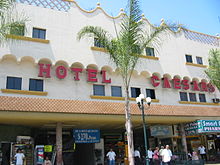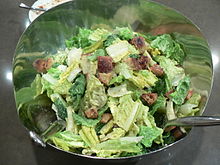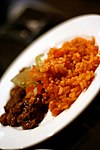| Revision as of 15:53, 29 January 2022 view source174.92.13.98 (talk) →Common ingredientsTag: Reverted← Previous edit | Revision as of 21:25, 29 January 2022 view source Beeblebrox (talk | contribs)Autopatrolled, Administrators114,301 edits Reverted good faith edits by 174.92.13.98 (talk): Not a standard ingredent in this dishTags: Twinkle UndoNext edit → | ||
| Line 49: | Line 49: | ||
| :* grated ] | :* grated ] | ||
| :* ]s | :* ]s | ||
| :* bacon | |||
| Variations include varying the leaf, adding meat such as grilled chicken or bacon, or omitting ingredients such as anchovies and eggs.{{citation needed|date=May 2018}} | Variations include varying the leaf, adding meat such as grilled chicken or bacon, or omitting ingredients such as anchovies and eggs.{{citation needed|date=May 2018}} | ||
Revision as of 21:25, 29 January 2022
Green salad of romaine lettuce and croutons | |
| Course | |
|---|---|
| Place of origin | Mexico |
| Region or state | Tijuana, Baja California |
| Created by | Caesar Cardini |
| Invented | 1924 |
| Serving temperature | Chilled or room temperature |
| Main ingredients | Romaine lettuce, croutons, Parmesan cheese, lemon juice, olive oil, egg, Worcestershire sauce, anchovies, Dijon mustard, black pepper |
| Variations | Multiple |
A Caesar salad (also spelled Cesar and Cesare) is a green salad of romaine lettuce and croutons dressed with lemon juice (or lime juice), olive oil, egg, Worcestershire sauce, anchovies, garlic, Dijon mustard, Parmesan cheese, and black pepper.
In its original form, this salad was prepared and served tableside.
History
The salad's creation is generally attributed to restaurateur Caesar Cardini, an Italian immigrant who operated restaurants in Mexico and the United States. His daughter Rosa recounted that her father invented the salad at his restaurant Caesar's (at the Hotel Caesar in Tijuana, Mexico) when a Fourth of July rush in 1924 depleted the kitchen's supplies. Cardini made do with what he had, adding the dramatic flair of the table-side tossing "by the chef." Cardini was living in San Diego, but he was also working in Tijuana, where he avoided the restrictions of Prohibition. A number of Cardini's staff have said that they invented the dish.


Julia Child said that she had eaten a Caesar salad at Cardini's restaurant when she was a child in the 1920s. In 1946, newspaper columnist Dorothy Kilgallen wrote of a Caesar containing anchovies, differing from Cardini's version:
The big food rage in Hollywood—the Caesar salad—will be introduced to New Yorkers by Gilmore's Steak House. It's an intricate concoction that takes ages to prepare and contains (zowie!) lots of garlic, raw or slightly coddled eggs, croutons, romaine, anchovies, parmeasan cheese, olive oil, vinegar and plenty of black pepper.
According to Rosa Cardini, the original Caesar salad (unlike his brother Alex's Aviator's salad, which was later renamed to Caesar salad) did not contain pieces of anchovy; the slight anchovy flavor comes from the Worcestershire sauce. Cardini was opposed to using anchovies in his salad.
In the 1970s, Cardini's daughter said that the original recipe included whole lettuce leaves, which were meant to be lifted by the stem and eaten with the fingers; coddled eggs; and Italian olive oil.
Although the original recipe does not contain anchovies, modern recipes typically include anchovies as a key ingredient, which frequently is emulsified in bottled versions. Bottled Caesar dressings are now produced and marketed by many companies.
The trademark brands "Cardini's", "Caesar Cardini's" and "The Original Caesar Dressing" are all claimed to date to February 1950, although they were only registered decades later, and more than a dozen varieties of bottled Cardini's dressing are available today, with various ingredients.
As the salad moved North to the U.S, a key ingredient changed within the recipe. Lemon juice is commonly used, despite the original Caesar salad opting for lime. It is thought the confusion came from the Spanish word for 'lime' being 'limón', which sounds like 'lemon'.
Common ingredients


Common ingredients in many recipes:
- romaine or cos lettuce
- olive oil
- crushed garlic
- salt
- Dijon mustard
- black pepper
- lemon juice
- Worcestershire sauce
- anchovies
- raw or coddled eggs
- grated Parmesan cheese
- croutons
Variations include varying the leaf, adding meat such as grilled chicken or bacon, or omitting ingredients such as anchovies and eggs.
Health concerns
Main article: Egg as food § ContaminationThere is inherent risk of infection by salmonella bacteria occasionally found in raw egg from cracked or improperly washed eggshells. However, some countries such as the UK have eliminated this risk through vaccination and tracking strategies. Nevertheless, later versions of the recipe call at least for briefly cooked coddled eggs or pasteurized eggs. Recipes may omit the egg and produce a "Caesar vinaigrette". Many variations of this salad exist; yogurt is sometimes substituted for the eggs to maintain a creamy texture and others call for using mayonnaise.
See also
References
- Burke, David; Choate, Judith (2009). "Caesar salad". David Burke's New American Classics. Knopf Doubleday Publishing Group. p. 67. ISBN 9780307519436. Retrieved 12 July 2016.
- "Cesar Cardini, Creator of Salad, Dies at 60". Los Angeles Times. 5 November 1956.
Caesar Cardini, 60, credited with the invention of the Caesar salad, died
- Andersen, Kathleen Mary (22 February 2006). "Hail Caesar! And Hold the Anchovies". Life in My Opinion (blog). Archived from the original on 4 March 2016. Retrieved 17 December 2020.
- "Rosa Cardini". The Telegraph. 21 September 2003. Archived from the original on 27 March 2019. Retrieved 10 February 2012.
- ^ Grant, Dorothy (15 June 2007). "Hail to all fathers, and hail Caesar!". TCPalm. Archived from the original on 8 March 2016. Retrieved 17 December 2020.In , D. Grant quotes Aviator's salad and more (2007)
- "The History of Caesar Salad". Kitchen Project. Archived from the original on 2 July 2007. Retrieved 18 December 2020.
- ^ Child, Julia; Child, Paul (1975). From Julia Child's Kitchen. New York: Alfred A. Knopf. ISBN 978-0394480718.
- Kilgallen, Dorothy (2 August 1946). "The Voice of Broadway". The News-Herald (Franklin, Pennsylvania). p. 4. Retrieved 18 December 2020.
- "My father always used Lea and Perrins Worcestershire sauce, and anchovies are one of its ingredients. He meant this to be a subtle salad, and anchovies can be overwhelming." (Above quoted 1987 interview with Rosa Cardini)
- "The Best Caesar salad". Seriouseats.com. Archived from the original on 12 June 2018. Retrieved 30 May 2018.
- "United States Patent and Trademark Office, serial numbers 73426710 "Cardini's", registered 1983 by Caesar Cardini Foods, 73782270 "The Original Caesar Dressing" and "Caesar Cardini's", registered 1989 by Dolefam Corporation, which later merged with T. Marzetti". Tess.uspto.gov. Archived from the original on 24 July 2013. Retrieved 2 October 2018.
- Gora, L. Sasha. "The surprising truth about Caesar salad". www.bbc.com. Retrieved 23 April 2021.
- "La Ensalada". Caesarstijuana.com. Archived from the original on 12 June 2018. Retrieved 30 May 2018.
- "Caesar salad". Bettycrocker.com. Archived from the original on 31 October 2010. Retrieved 7 November 2014.
- "Egg Products and Food Safety". United States Department of Agriculture Food Safety and Inspection Service. 10 August 2015. Retrieved 17 December 2020.
- Hughes, Dominic (11 October 2017). "Runny eggs 'safe for pregnant women'". BBC News. Retrieved 2 October 2018.
- Weir, Karen. "Caesar Salad Supreme". Allrecipes.com. Retrieved 18 December 2020.
Bibliography
- Julia Child; Paul Child (1975). From Julia Child's Kitchen. Alfred A. Knopf. ISBN 978-0394480718.
Further reading
- Greenfield, Terry D. (1996). Lorna Bolkey; Kathryn Hall (eds.). In Search of Caesar: The Ultimate Caesar Salad Book. Alexander Books. ISBN 978-1570900143.
- Mariani, John F. (1985). The Dictionary of American Food and Drink. Book Sales. ISBN 978-0899191997.
- Stradley, Linda; Cook, Andra (1997). What's Cooking America. Chehalem Publishing. ISBN 978-1885221551.
- Trager, James (1995). The Food Chronology: A Food Lover's Compendium of Events and Anecdotes, from Prehistory to the Present. Henry Holt and Company. ISBN 978-0805033892.
External links
| Salad dressings | ||
|---|---|---|
| Condiments |  | |
| Types | ||
| Manufacturers | ||
| Mexican cuisine | |||||||||||
|---|---|---|---|---|---|---|---|---|---|---|---|
| List of Mexican dishes | |||||||||||
| Soups and stews | 
 | ||||||||||
| Rice and pasta dishes | |||||||||||
| Bean dishes | |||||||||||
| Egg dishes | |||||||||||
| Vegetable dishes | |||||||||||
| Meat dishes |
| ||||||||||
| Other protein dishes | |||||||||||
| Cheese dishes | |||||||||||
| Antojitos |
| ||||||||||
| Sauces and condiments | |||||||||||
| Desserts and sweets | |||||||||||
| Salads | |||||||||||
| Breads | |||||||||||
| Beverages | |||||||||||
| Variants |
| ||||||||||









